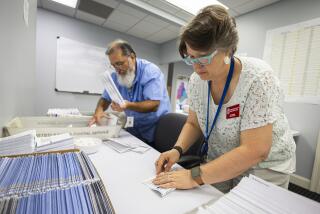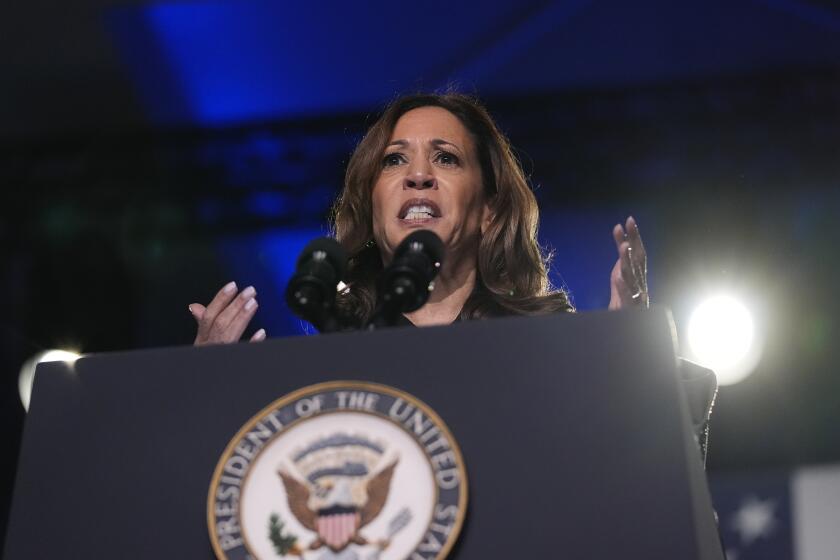Private student loan rescues opposed
Student advocacy groups are urging the Treasury Department to prevent a new $200-billion consumer-lending program from benefiting private student lenders, which they say are largely unregulated and prey on students with risky, high-interest loans.
The program, announced this week and developed by the Treasury and Federal Reserve, is not aimed specifically at the student loan market. Its much broader goal is to encourage lending to consumers -- including car loans and credit cards -- as well as help the financial system by increasing liquidity in the credit markets.
But groups including Consumers Union, the nonprofit group that publishes Consumer Reports magazine, and the American Assn. of Collegiate Registrars and Admissions Officers say the money will also help prop up private providers of student loans, which often offer high and variable interest rates but not the consumer protections guaranteed under federal loan programs.
Private student loans, a primary focus of a nationwide conflict-of-interest scandal last year, are the fastest-growing segment of the $85-billion-a-year student loan market.
“A bailout for the providers of usurious private student loans will not solve the college affordability crisis caused by the failing economy, and would actually be detrimental to many students and consumers,” advocacy groups said in a letter last week to Treasury Secretary Henry M. Paulson after he signaled that the department was developing the program. “However, if you continue to pursue any form of rescue for private student loans, it would be unconscionable to do so without also providing better consumer protections.”
The plan’s effect on student lending highlights the potential unintended consequences from the enormous bailout program as officials rush to rescue the nation’s financial system.
Michelle Smith, a Federal Reserve spokeswoman, said the program’s formulators were solely concerned with trying to salvage the economy, not with broader discussions of student loan policy. Such issues, she said, would be more appropriately addressed by the Bush administration, which thinks private loans are an important part of the financial aid system.
Officials in the lending industry hailed the new plan as a crucial step toward ensuring that the private student loan market does not collapse.
“The announcement of the intervention is welcome news to anybody concerned about not having students’ education plans for the current academic year disrupted,” said John Dean, special counsel to the Consumer Bankers Assn., which represents many large student loan companies.
Democratic leaders on the congressional education committees, who have investigated abuses by the private student loan industry, said they were alarmed that bailout money could be funneled toward these companies. The lawmakers were not informed about the plan and were unclear how it would be implemented.
“I’m very skeptical,” said Rep. George Miller (D-Martinez), chairman of the House Education and Labor Committee. “My concern here is that what Paulson may be doing is borrowing the good name of student loans to bail out some very bad actors.”
Education Department officials praised the plan for helping to create new private and federal loans. “The department fully supports the program,” said spokeswoman Samara Yudof.
The government’s new program is meant to help the consumer-lending industry by lending as much as $200 billion to investors who hold securities backed by student loans or other forms of consumer credit. Federal officials hope that lending will jump-start the credit markets and encourage companies to offer loans for cars, credit cards and college.
The $17-billion-a-year private student loan industry has been hit particularly hard by the financial meltdown, according to industry groups and analysts. Thirty-seven firms have stopped issuing private student loans, and investors have been reluctant to put money toward them, according to FinAid.org, a website that tracks the industry.
The government’s plan will primarily benefit large lenders, which are more likely to have sufficient capital, said Mark Kantrowitz, FinAid’s publisher. Smaller lenders, which often offer lower rates, will be largely shut out, he said, making it unlikely that the plan will lead to significantly lower rates.
Sallie Mae, the nation’s largest lending company, has offered private loans with an average interest rate of 11% to 13%, nearly twice as much as federal loans, according to Student Lending Analytics, a California-based firm that advises financial aid offices. It said Sallie Mae, which controlled 42.5% of the private student loan market last year, had offered some private loan variable rates that are more than 17%.
Tom Joyce, a spokesman for Sallie Mae, said the average rate now is between 10% and 11%, around what most banks are charging for private student loans, which are not subsidized and government-guaranteed like federal loans.
“The comparison to federal student loan rates is unfair and artificial,” he wrote in an e-mail. “The comparison should be to borrowing on a credit card or other unsecured loans.”
The student and consumer advocacy groups who wrote to Paulson say that far too many students unnecessarily take on private student loans. One out of five private student loan borrowers did not first take out federal student loans, and nearly half did not borrow the maximum amount available under the federal programs, according to a study by the American Council on Education, which represents college and university presidents.
Experts and government officials say students should exhaust federal student loans before they turn to private ones.
The estimated 8% of undergraduates who take out private loans are often the victims of misleading and deceptive advertising, and get saddled with interest rates two or three times as high as federal loans, according to the Nov. 19 letter to Paulson. The Treasury has not responded to the letter.
Industry officials counter that private student loans are crucial for students struggling to pay ballooning tuition costs. The National Assn. of Student Financial Aid Administrators called private student loans a “necessary evil.”
“How realistic is it to say that families shouldn’t use private student loans when college costs are increasing faster than the rate of inflation?” said Kevin Bruns, executive director of America’s Student Loan Providers, an industry group.
Federal loans, however, can cover the entire cost of tuition and living expenses in nearly all cases, consumer advocates say.
“The less dependent that students are on private student loan financing to pay for college, the better off they will be in the long run,” said Christine Lindstrom, the director of the higher education project at U.S. Public Interest Research Groups. “Private student lenders and banks do not need further incentives to push-market their expensive, risky loan products on vulnerable students and families.”
More to Read
Sign up for Essential California
The most important California stories and recommendations in your inbox every morning.
You may occasionally receive promotional content from the Los Angeles Times.










